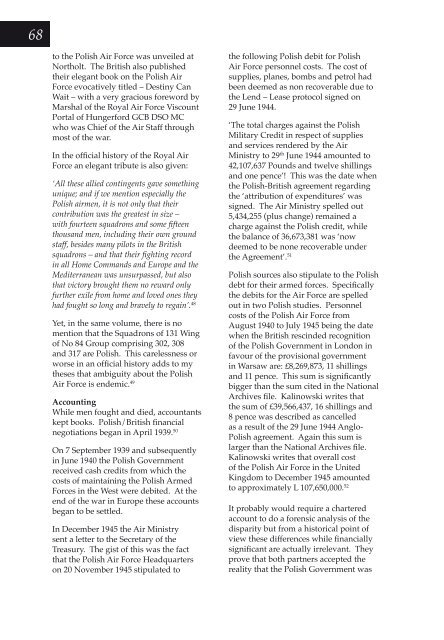REVIEW - Royal Air Force Centre for Air Power Studies
REVIEW - Royal Air Force Centre for Air Power Studies
REVIEW - Royal Air Force Centre for Air Power Studies
You also want an ePaper? Increase the reach of your titles
YUMPU automatically turns print PDFs into web optimized ePapers that Google loves.
68<br />
to the Polish <strong>Air</strong> <strong>Force</strong> was unveiled at<br />
Northolt. The British also published<br />
their elegant book on the Polish <strong>Air</strong><br />
<strong>Force</strong> evocatively titled – Destiny Can<br />
Wait – with a very gracious <strong>for</strong>eword by<br />
Marshal of the <strong>Royal</strong> <strong>Air</strong> <strong>Force</strong> Viscount<br />
Portal of Hunger<strong>for</strong>d GCB DSO MC<br />
who was Chief of the <strong>Air</strong> Staff through<br />
most of the war.<br />
In the official history of the <strong>Royal</strong> <strong>Air</strong><br />
<strong>Force</strong> an elegant tribute is also given:<br />
‘All these allied contingents gave something<br />
unique; and if we mention especially the<br />
Polish airmen, it is not only that their<br />
contribution was the greatest in size –<br />
with fourteen squadrons and some fifteen<br />
thousand men, including their own ground<br />
staff, besides many pilots in the British<br />
squadrons – and that their fighting record<br />
in all Home Commands and Europe and the<br />
Mediterranean was unsurpassed, but also<br />
that victory brought them no reward only<br />
further exile from home and loved ones they<br />
had fought so long and bravely to regain’. 48<br />
Yet, in the same volume, there is no<br />
mention that the Squadrons of 131 Wing<br />
of No 84 Group comprising 302, 308<br />
and 317 are Polish. This carelessness or<br />
worse in an official history adds to my<br />
theses that ambiguity about the Polish<br />
<strong>Air</strong> <strong>Force</strong> is endemic. 49<br />
Accounting<br />
While men fought and died, accountants<br />
kept books. Polish/British financial<br />
negotiations began in April 1939. 50<br />
On 7 September 1939 and subsequently<br />
in June 1940 the Polish Government<br />
received cash credits from which the<br />
costs of maintaining the Polish Armed<br />
<strong>Force</strong>s in the West were debited. At the<br />
end of the war in Europe these accounts<br />
began to be settled.<br />
In December 1945 the <strong>Air</strong> Ministry<br />
sent a letter to the Secretary of the<br />
Treasury. The gist of this was the fact<br />
that the Polish <strong>Air</strong> <strong>Force</strong> Headquarters<br />
on 20 November 1945 stipulated to<br />
the following Polish debit <strong>for</strong> Polish<br />
<strong>Air</strong> <strong>Force</strong> personnel costs. The cost of<br />
supplies, planes, bombs and petrol had<br />
been deemed as non recoverable due to<br />
the Lend – Lease protocol signed on<br />
29 June 1944.<br />
‘The total charges against the Polish<br />
Military Credit in respect of supplies<br />
and services rendered by the <strong>Air</strong><br />
Ministry to 29 th June 1944 amounted to<br />
42,107,637 Pounds and twelve shillings<br />
and one pence’! This was the date when<br />
the Polish-British agreement regarding<br />
the ‘attribution of expenditures’ was<br />
signed. The <strong>Air</strong> Ministry spelled out<br />
5,434,255 (plus change) remained a<br />
charge against the Polish credit, while<br />
the balance of 36,673,381 was ‘now<br />
deemed to be none recoverable under<br />
the Agreement’. 51<br />
Polish sources also stipulate to the Polish<br />
debt <strong>for</strong> their armed <strong>for</strong>ces. Specifically<br />
the debits <strong>for</strong> the <strong>Air</strong> <strong>Force</strong> are spelled<br />
out in two Polish studies. Personnel<br />
costs of the Polish <strong>Air</strong> <strong>Force</strong> from<br />
August 1940 to July 1945 being the date<br />
when the British rescinded recognition<br />
of the Polish Government in London in<br />
favour of the provisional government<br />
in Warsaw are: £8,269,873, 11 shillings<br />
and 11 pence. This sum is significantly<br />
bigger than the sum cited in the National<br />
Archives file. Kalinowski writes that<br />
the sum of £39,566,437, 16 shillings and<br />
8 pence was described as cancelled<br />
as a result of the 29 June 1944 Anglo-<br />
Polish agreement. Again this sum is<br />
larger than the National Archives file.<br />
Kalinowski writes that overall cost<br />
of the Polish <strong>Air</strong> <strong>Force</strong> in the United<br />
Kingdom to December 1945 amounted<br />
to approximately L 107,650,000. 52<br />
It probably would require a chartered<br />
account to do a <strong>for</strong>ensic analysis of the<br />
disparity but from a historical point of<br />
view these differences while financially<br />
significant are actually irrelevant. They<br />
prove that both partners accepted the<br />
reality that the Polish Government was

















